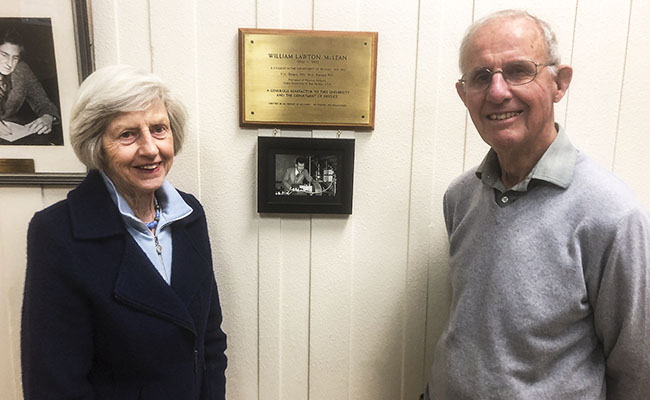
Ruth and Bruce Cooper with the Physics memorial plaque to Professor McLean
Bruce and Ruth Cooper (DipHSc, 1963) visited the University of Otago late last year to personally deliver documents, memorabilia and celebrate the life of Bruce's cousin, distinguished Otago alumnus Professor William (Bill) McLean.
The retired Christchurch couple were touched to learn of the prominently displayed plaque honouring Bill in the Department of Physics in the Science 3 building on the Dunedin campus. The department was the first in New Zealand and was a foundation discipline when the University of Otago opened in 1871.
University of Otago Physics Head of Department Professor Blair Blakie says, “we are immensely proud that an Otago physics graduate went on to have such an impactful career. Bill's work impacts modern technology around us every day.”
Fellow Department of Physics Senior Lecturer Philip Brydon was recently in the audience for a speech by Professor Piers Coleman, a world authority in condensed matter physics, from Rutgers University.

Professor McLean (second from right) with the Hills family in Princeton, New Jersey
“When I shared I worked at the University of Otago, he asked about Professor McLean whom he had known when he joined Rutgers. I confessed I didn't know much about Professor McLean at the time, but the question prompted me to investigate further,” Dr Brydon says.

Graduation day at Cambridge
Professor McLean attended Dunedin's King's High School and completed his bachelor's and master's degrees at the University of Otago. He then received a Shell Senior Scholarship to attend the University of Cambridge in England, where he completed his PhD in superconductivity. After a year at the University of British Columbia he moved to Rutgers University, where he worked for the rest of his life.
Sadly, Professor McLean passed away in 1990 at 56, after battling cancer. Professor McLean is noted for his legacy, which has helped fund the University of Otago's Vice-Chancellor's Discretionary fund.
Professor Blakie says that Professor McLean began work on superconductivity during his PhD studies at Cambridge, which began shortly after the development of the Bardeen, Cooper, and Schrieffer (BCS) theory.
Superconductivity is a low-temperature quantum state of matter where the electrical resistance vanishes and magnetic fields are expelled from the material. These "super" properties have fascinated generations of physicists but still remain just a bit too exotic for large-scale technological applications, Professor Blakie says.
Superconductivity aids in generating large magnetic fields required for medical diagnostic tools, particularly MRI machines, which need strong magnetic fields to probe inside a patient's body.
The large magnetic fields produced using superconductors also facilitates magnetic levitation trains (the fastest bullet trains) and are the basis of particle accelerators, such as the Large Hadron Collider (LHC) at the European Organisation for Nuclear Research (CERN) in Geneva, Switzerland.
“This must have been an exciting time as physicists sought to both confirm and fully understand the implications of this novel theory. During the next 20 years Professor McLean made a major contribution to these efforts through his careful experimental work, helping to establish BCS theory as one of the most successful of all time.

Professor McLean (left) at a conference
“Although much of the early work on these strange materials proved ephemeral (lasting a short time), Professor McLean's contribution remains influential - one of his papers from 1987 is still being regularly cited and is steadily closing in on 900 citations,” Professor Blakie says.
Development and Alumni Relations Office Director Shelagh Murray says Professor McLean's generosity and foresight to support his old university, has helped many Physics students follow in his footsteps.
“The University of Otago is deeply grateful to Professor McLean for his gift and to the Cooper family for sharing many of their valuable treasures from Professor McLean's life. We look forward to maintaining and building this relationship in the years to come,” Ms Murray says.